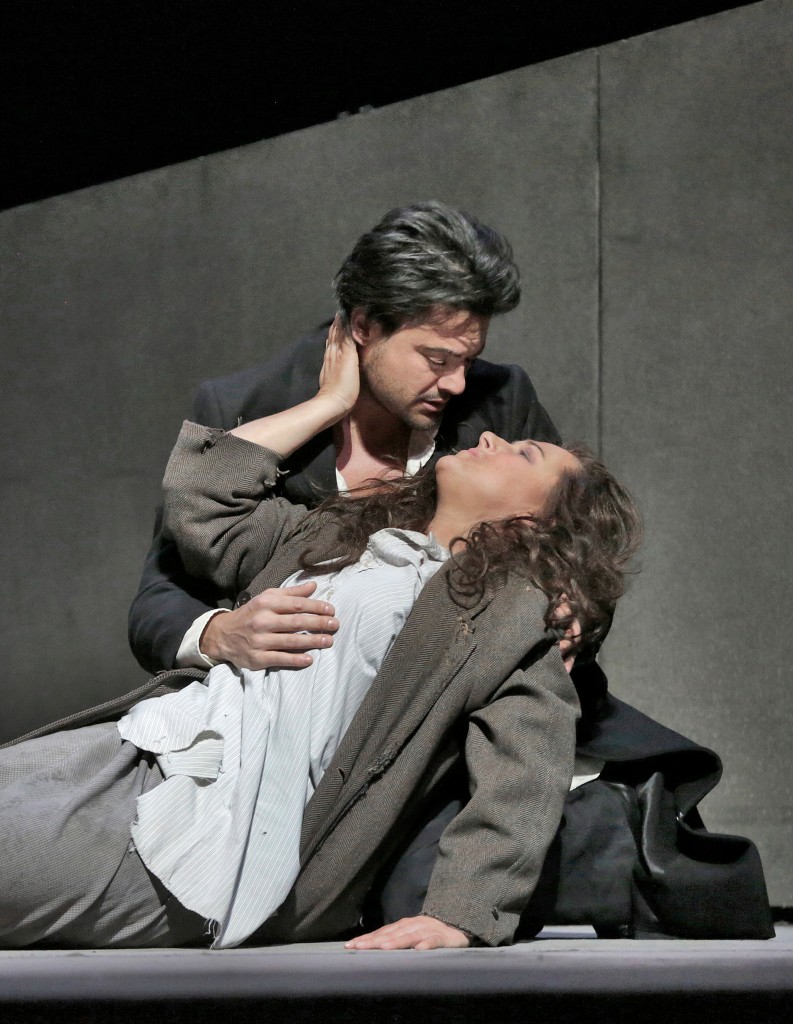Damrau and Grigolo ignite in Met’s thrilling “Manon”

Diana Damrau and Vittorio Grigolo in Massenet’s “Manon” at the Metropolitan Opera. Photo: Ken Howard
As powerful as a good romance can be, one doesn’t necessarily expect a white-knuckle experience from Massenet’s tuneful Manon. This season’s pairing of Diana Damrau and Vittorio Grigolo at the Metropolitan Opera for the first time on Monday, brought relentless energy from curtain to curtain, resulting in one of the most thrilling nights of the season.
Damrau might not be the first soprano one would think of for the role of Massenet’s fallen ingénue. She is, though, one of our greatest sopranos, and to hear her step out of her safe zone gives us, if anything, an opportunity to hear this great role from a different angle. Her peppery voice brought out the youthful energy of the glamorous Gavotte in Act III, and she milked the number for all it was worth. Here, as elsewhere, she reveled not just in the richness of her character, but in every twist, turn, and ornament of the music itself.
There was far more than just glamour to Damrau’s performance—in her tenderest encounters with des Grieux, such as the memorable duet “N’est-ce plus ma main” at the close of the third act, she sang barely above a whisper, her words intended for his ear alone. It was as though Damrau was inviting the audience to witness her most intimate, most vulnerable moments; and, after all, those intimate moments are Massenet’s bread and butter: It’s no coincidence that we remember so many of his duets and so few of his ensemble numbers.
Intimacy, granted, is not chief among Vittorio Grigolo’s strengths. He seems only to have one energy level—turbo—and often turns his onstage romances into The Vittorio Grigolo Show. Indeed, upon first meeting Manon, he began to drag her violently around the stage. One almost wanted to shake him, and remind him that he still had four acts to go.
Yet Grigolo’s urgent pace worked perfectly for his obsessive take on des Grieux. Lest anyone forget, this tenor sports an outsize voice to go with his outsize personality. The sheer volume of sound he was able to produce was almost unbelievable, and the quality of that sound was superb—he gave us taut, gleaming, high-octane fire. Of nuance there was little—\he scarcely dropped below a forte all night (and those rare attempts at a piano did not always come off well) but the dynamism of his performance was invigorating.
The electric duo fed off each other all night, weaving a spell over the entire house. There were loud ovations every step of the way, beginning with the lovers’ first ecstatic encounter. Even the fourth act, which has little in the way of memorable material, was interrupted by a chorus of cheers. Their tragic final scene, both a reconciliation and a tearful parting, was arresting.
Emmanuel Villaume certainly deserves some credit for crafting this searing performance, some shaky ensemble notwithstanding. While he tended to get sluggish when left to his own devices, he admirably played the role of a facilitator, supporting the lead singers with rich, colorful sound from the orchestra.
Laurent Pelly’s 2012 production is not brilliant. A stuffy gloom hangs over most of it, and a number of touches seem too clever by half: the street setting of the first act, capped with crenellations suggesting distant houses, is smartly executed, but it’s fair to ask why the set has to look as though it’s made of recycled cardboard.
The staging’s use of space, though, is highly effective, nimbly facilitating the awkward comings and goings of the opera’s chorus (who were, as ever, superb throughout the night). This might not be the highest praise, but the production does its job—Manon is a star vehicle, pure and simple, and Pelly never gets in the way.
Christophe Mortagne was superb reprising the role of Guillot, a lecherous caricature with an excellent sense of physical comedy. Russell Braun’s tuning was initially a little suspect, but he righted himself and brought wine-dark tone to bear as Lescaut. Nicolas Testé, singing just the second role of his young Met career, impressed as the elder Count des Grieux with his smoky, imposing voice; his surprise entrance into the gambling den was as intimidating as any Commendatore.
Manon runs through March 28 at the Metropolitan Opera. metopera.org